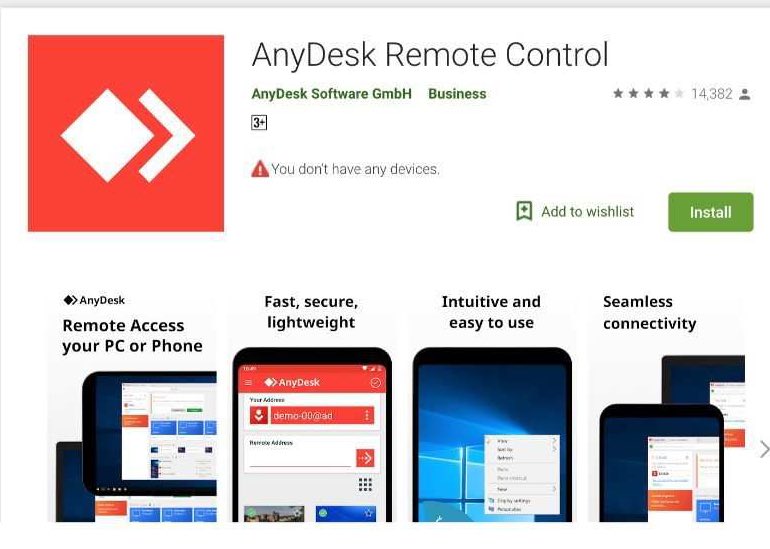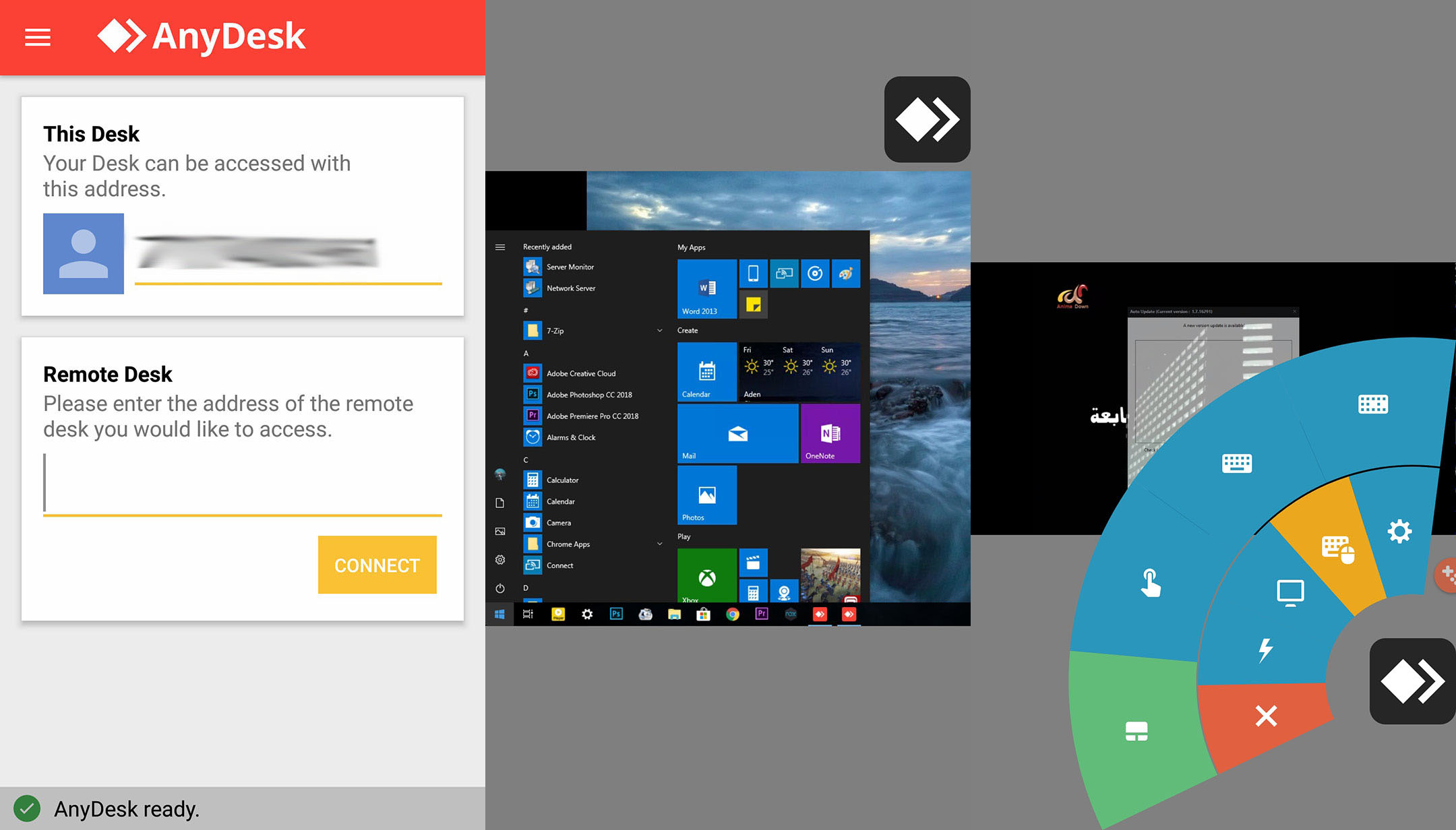
- 1Pie Menu
- 4Settings
- 6Troubleshooting
- AnyDesk enables remote desktop operations with unparalleled performance. Such as Video/Image editing, administration and teamwork. AnyDesk provides banking-level security using TLS 1.2 encryption.
- The screen contents are hidden for anyone with physical access to the remote device. Input and sound from the remote side is also blocked during privacy mode until either the session ends or privacy is disabled.
- AnyDesk Software GmbH, technology leader in remote access software, released the new version of the fastest and most affordable solution on the market: AnyDesk 5.0. The new version provides users with a series of new features and upgrades, including a new user interface that makes working with the application easier and more intuitive.
AnyDesk provides the solution to agree upon an unattended password, so that the remote client doesn't need to be present to accept a request to enter a session. Note: AnyDesk also connects to the Lock Screen or Login Screen prior entering the windows session, when either is installed or runs as Administrator / is elevated.

| AnyDesk for Android |
|---|
| Required Android: outgoing connections 4.4 or higher, |
| Remote Control: 7 or higher |
| AnyDesk on Google Play |
Warning: As of Android 10 and depending on the smartphone provider, 8 and 9, users will get an Android security prompt regarding casting when connecting to the Android device. For most, this message is unskippable and requires the end user to manually accept the prompt before the connecting user is able to establish the session.
| Setup and ID | The ID is created on the initial startup and remains valid until you remove the application. |
|---|---|
| Auto Discovery | Devices using AnyDesk are automatically displayed. See: Discovery |
| Unattended Access | Unattended access is also available for Android Setup the unattended password in the security settings. |
Pie Menu
Anydesk Remote Desktop Download
During the session, a pie menu indicated by the AnyDesk logo provides the session settings.
Double-tap the button to move it on the screen.Hold on a Pie Menu Item to get the tooltip.
- The Settings Menu consists of:
- Settings
- Select Input Type
- Choose Monitor
- Actions
- Close session
Settings
Settings from the Pie Menu override the settings taken care of from the Main Menu
and are valid for the current session ID.
Choose Remote Monitor
Choose which display to view when remote device has multiple monitors.
Actions Menu
Actions menu indicated by lightening offers functions to be triggered on the remote device:

- Take a screenshot
- Upload file to clipboard on remote device.
- Download file from clipboard of remote device.
- Request elevation (UAC in Windows)
- Send Ctrl + Alt + Del (SAS)
- VPN
- Privacy
Close Session
Tap the session Menu This will close the connection.
Change Input Type
Open Menu and swipe to the Input Tile From top:
- Special keyboard like F1, Windows-Key, Tab, etc.
- open keyboard (Keyboard which you have installed on your Android device)
Items below are the three Input methods
- Mouse mode - (default for Android to Desktop) emulates a mouse.
- Touchpad mode - control your remote device like a touchpad with swipes.
- Touch to Touch mode - (default for Android to Android)
- Translate mouse input to touch input - default settings to enable mouse to touch translation.
- Gestures:
Mouse and Touchpad mode:
- One-finger swipe moves the mouse
- Two-finger swipe zooms the image.
- Three-finger swipe scrolls
- Single tap for left mouse-click
- Hold for right-mouse-click
- Three-finger tap for middle-click
Android Hotkeys
To invoke a command, open the keyboard settings in a session or hold the keys ctrl+alt+shift at the same time and press one of the following keys:
| Key | Function |
|---|---|
| F5/Home/Pos1 | Android Home |
| F6/Backspace | Android Back |
| F7 | Volume Down |
| F8 | Volume Up |
| F9/Escape | Android Power |
| F10 | Android Menu |
| End | Android DPAD Center |
Main Menu and Settings
Open the main menu by swiping from the left on the start-screen
or by tapping the three-stripe button on the top left.
- Address Book - If a licensed custom client is used
- Session Recordings
- Settings
- Tutorial
- Help (support.anydesk.com)
- About AnyDesk
- Quit AnyDesk

Settings
The Settings on Android are based on the Settings of AnyDesk on Windows.
For usability, available options are tailored for Android.
| General | Choose an alias and if it should be displayed instead of the ID. |
|---|---|
| Security | Set interactive access, unattended access, Two-Factor authentication, standard permissions, discovery behavior and Settings protection by device password or biometric authentication. |
| Privacy | Choose username and image. |
| Input | Automatic Keyboard: Choose if keyboard appears when text input field is tapped. Choose Touch Mode: Mouse or Touchpad |
| Display | Choose whether to show remote cursor Quality:
|
| Audio | Choose whether microphone is transmitted. Choose whether audio from remote client will be transmitted. |
| Connection | Connection Settings to setup Proxy and connection behavior.
|
| Recording | Choose to record session at startup
|
Using AnyDesk with managed Profiles (Work Profile)
Steps to make the plugin AD1 ready for AnyDesk connections to a managed profile (Order is important)
- Make sure the plugin is installed in main profile and in managed profile.
- Make sure the plugin is activated in the accessibility settings.
- Open the plugin inside the main profile. Click on the overflow button and configure the plugin.
- If that does not work, try it from the managed profile. You might need to allow cross profile communication in your MDM solution.
- The relevant filter is:
action='com.anydesk.adcontrol.ad1.CONFIGURE' category='android.intent.category.DEFAULT' - Code example:
filter = new IntentFilter(); filter.addAction('com.anydesk.adcontrol.ad1.CONFIGURE'); filter.addCategory(Intent.CATEGORY_DEFAULT); int flags = DevicePolicyManager.FLAG_MANAGED_CAN_ACCESS_PARENT | DevicePolicyManager.FLAG_PARENT_CAN_ACCESS_MANAGED; devicePolicyManager.addCrossProfileIntentFilter(getComponentName(context), filter, flags);
- The relevant filter is:
Mobile Device Management
As of version 6.1.10 the AnyDesk Android app can be integrated with Microsoft Intune.
This is currently only available for the standard AnyDesk client, which can then be customized on the Microsoft Intune Web-UI.
Anydesk Remote Control
On the Microsoft Intune Web-UI all available options are displayed, including short descriptions of how they work and what they do.
For more specific information on how to do this, click here.
Troubleshooting
Plugin can´t be activated
Due to changes by some vendors on Android, a restart of the Android device may be required for the control plugin to be functional.
Android TV Plugin
Warning: Please note that the usage of this workaround is without warranty from AnyDesk, and can harm and even violate the warranty of your device.
In the event that the vendor for Android/Fire TV device has disabled the Accessibility settings, the control plugin for AnyDesk cannot be activated.
AnyDesk can then be used for Remote View only. A possible workaround is to use the adb shell.
The plugin can be enabled using the following command:adb shell settings put secure enabled_accessibility_services com.anydesk.adcontrol.ad1/com.anydesk.adcontrol.AccService
More information about adb can be found at the official adb documentation.
Screenrecording Dialog (Android 10+)
Starting with Android 10 and newer, Android forces to accept a Dialog for Screen recording.A workaround to bypass the request is the following adb shell command:
regular version: adb shell appops set com.anydesk.anydeskandroid PROJECT_MEDIA allow
custom client: adb shell appops set com.anydesk.anydeskandroid.custom PROJECT_MEDIA allow
Send Support Information
Send trace files on error or after crash:
- Open the sidebar
- Switch to 'About AnyDesk'
- Choose Send Support Information
| Why RemotePC™ | RemotePC™ | AnyDesk |
| PC Mag Rating | 4 Out of 52018 | NA |
| ITPro Editors Choice Review | 5 Out of 52020 | NA |
| Pricing | RemotePC SOHO Plan for 10 computers
| AnyDesk Lite Plan starts from $129.00 per year for 1 computer |
| Access via web | Use Viewer Lite to connect to remote computers from right within a browser, with no software installation | No option for accessing via web |
| Online meetings and video conferences | RemotePC™ Meeting provides powerful video conferencing tools to host and attend meetings from anywherevideo sharing | No option for online meetings |
| Drag and drop files | Drag and drop files between remote and local computers and vice-versa during an ongoing session | No option to drag and drop files between computers during an ongoing session |
| File transfer from mobile | Transfer files while accessing your remote computer from mobile devices | No option to transfer files while accessing remote computer from mobile devices |
| Multiple monitor display | Toggle between multiple monitors of the remote computer or view them all at once | No option to view multiple monitors of the remote computer at once |
| Remote reboot | The remote computer can be restarted in normal mode and safe mode (Windows) during an ongoing remote session from the Viewer | No option for restarting the remote computer from the Viewer |

